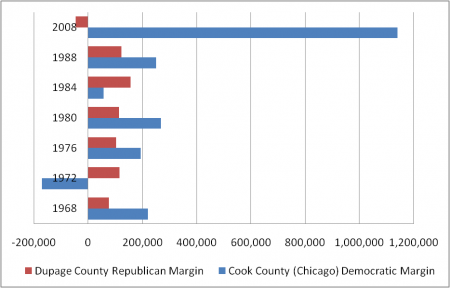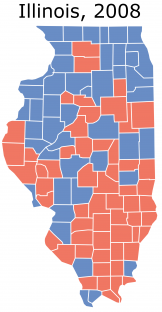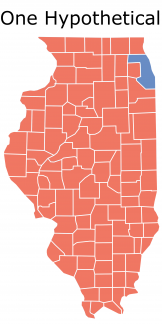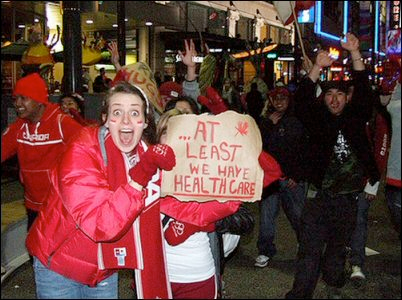• AZ-Sen: It’s getting to the point where the real question is, is there any key establishment Republican left who hasn’t endorsed John McCain in his GOP primary duel with J.D. Hayworth. Apparently, the specter of teabagger revolt over snubbing Hayworth isn’t too intimidating to anybody. Today, it was Minnesota governor and likely presidential candidate Tim Pawlenty who gave McCain the thumbs-up.
• CA-Sen: There was a Senate component to that poll of Republican primary voters by M4 Strategies on behalf of the Small Business Action Committee, too. They find ex-Rep. Tom Campbell in the lead at 32, with Carly Fiorina following at 19 and Assemblyman Chuck DeVore at 11.
• FL-Sen: You’ve probably already seen these rumors, but in case you hadn’t, Jack Furnari, a conservative activist and a regular contributor to the Ft. Lauderdale Sun-Sentinel’s political blog, says that multiple sources have told him that Charlie Crist is preparing to cast off his scarlet “R” and run for the Senate as an indie. Crist‘s communications director, however, says this is a “patently false rumor.”
• KY-Sen: Rand Paul is already making a strong push for the finish line in the May 18 Senate GOP primary. He’s begun reserving $332K in airtime for the weeks before the primary. So far, the moneybomb-propelled Paul has already spent $291K on TV ads while Trey Grayson is just getting started, with a $17K buy, which may explain some of the disparity between the two in the polls right now.
• NC-Sen: Lots of numbers out of North Carolina to look at this morning. Most notably, Rasmussen looks at the general election, finding Richard Burr with a sizable edge over both Democratic challengers; Burr leads SoS Elaine Marshall 50-34 and leads ex-state Sen. Cal Cunningham 51-29. Civitas doesn’t have general election numbers, but looks at the Democratic primary, where they find a whole lotta undecideds: Marshall leads Cunningham 14-4, with Cunningham actually being outpaced by attorney Kenneth Lewis at 5. (PPP, who polled the primary last week, seems to have pushed leaners harder, with Marshall at a whopping 29, followed by Cunningham at 12 and 5 for Lewis.) Finally, Elon (pdf) doesn’t have any head-to-heads at all, but has some approval numbers: Richard Burr is generates a whole lot of indifference, with favorables that work out to 30/23, with 29 for “don’t know” and 19 for “neither favorable/unfavorable” (which is interesting — I’d like to see more pollsters include “meh” as an option). Burr also has an ominous 24% re-elect (with a 51% “time for someone new”). Elaine Marshall’s favorables are at 19/8.
• WI-Sen: Republican real estate developer Terrence Wall, thanks to his own money, is the most imposing candidate currently in the race against Russ Feingold in Wisconsin, and he has his own internal poll out courtesy of POS. It suggests that Feingold shouldn’t take his re-election campaign for granted even if Tommy Thompson doesn’t make a surprise re-entry into the political arena; Feingold leads Wall by a 46-39 margin.
• AR-Gov: Looks like the Republicans have found someone willing to take one for the team and run against Democratic incumbent Gov. Mike Beebe, who usually polls as the nation’s most popular governor. Former state Sen. Jim Keet says he’s “90% certain” he’ll run. Keet (who’s a personal friend of Beebe) offers a rationale for his candidacy that seems in line with his chances of winning: “If we don’t have candidates that are willing to stand up despite the odds in both parties, then we’ll never have the best possible government. It’s good to have competing views and candidates on both sides of the aisle.”
• MD-Gov: Rasmussen takes its first look at the Governor’s race in Maryland, where incumbent Dem Martin O’Malley may face a rematch with ex-Gov. Bob Ehrlich (who hasn’t declared anything, but is starting to act candidate-ish). Their results are right in line with most other pollsters, who’ve seen an O’Malley lead in the high single-digits over Ehrlich; Rasmussen says it’s 49-43.
• NH-Gov: With a late entry, it looks like the Republicans are getting an uprgrade in their race against Democratic Gov. John Lynch, another incumbent considered mostly unassailable. The state’s former health and human services commissioner, and loser of the 2002 and 2008 NH-01 GOP primaries, John Stephen, says he’ll give it a whack. (Ex-Rep. Jeb Bradley, who won both those primaries, is chairing Stephen’s campaign.) Social conservative activist Karen Testerman is probably the best-known GOPer in the race so far.
• SD-Gov: Rasmussen had good news for Rep. Stephanie Herseth Sandlin yesterday, and they have some more positive data for the Dems, this time in the gubernatorial race. State Sen. minority leader Scott Heidepriem actually leads against two out of three Republican opponents; he leads state Sen. majority leader Dave Knudson 34-31, and teabagging state Sen. Gordon Howie 37-29. Unfortunately, Heidepriem trails the Republican field’s most likely frontrunner, Lt. Governor Dennis Daugaard, 41-32.
• TX-Gov: It looks like the DGA is seeing the same polls that we’re seeing. Feeling bullish on ex-Houston mayor Bill White’s chances in the gubernatorial race, they’ve pumped $500K into White’s campaign. White, at $5.4 million, already has doubled up on cash against his likely opponent, incumbent GOP Gov. Rick Perry (who’s at $2.5 million, and may get further drained if he doesn’t avoid a runoff in his primary).
• FL-25: A name recognition poll of possible Republican replacements for Rep. Mario Diaz-Balart (by Republican pollster Hill Research) seems to give a name rec edge to potential candidate state Sen. Alex Diaz de la Portilla, with 39/9 favorables. State Rep. David Rivera, who’s already made his candidacy official, is a bit less known, at 24/5. The best-known person polled is Miami-Dade Co. Commissioner Joe Martinez (at 34/17), who hasn’t really expressed much interest yet.
• KS-04: SurveyUSA has another poll in Kansas, where there’s a competitive GOP primary in three different open House seats. Today, they focused on the Wichita-based 4th. I’m wondering if businessman Wink Hartman has been advertising while everyone else has been silent, because that’s the only explanation I can think of for his big lead. Hartman is at 36, beating all his insider opponents: state Sen. Dick Kelsey is at 11, with state Sen. Jean Schodorf and former RNC committeeman Mike Pompeo both at 10. (Either that, or people think they’re voting for Wink Martindale.)
• NY-15: With Rep. Charlie Rangel having been on the wrong end of an Ethics Committee ruling yesterday, names are starting to trickle in from fellow House members who want him to put down his Ways and Means gavel. Paul Hodes (running for Senate in NH) was the loudest, along with Bobby Bright and Gene Taylor. Newly-elected Mike Quigley is the only safe-seat Dem to chime in, at least so far.
• PA-12: One more big development in the “race” in the 12th, where candidates are jostling to get picked by committee to run in the May 18 special election. Former Lt. Governor Mark Singel suddenly pulled his name out of consideration, which may suggest that there’s a lot of insider movement toward John Murtha’s former district director, Mark Critz. Singel threw his support to Critz, who previously got the endorsements of two other possible candidates, Joyce Murtha and moneybags businessman Mark Pasquerilla. With Westmoreland Co. Commissioner Tom Cesaro also withdrawing his name, it looks like it’s heading down to a choice between Critz and former state Treasurer Barbara Hafer for the Dem nomination. (Hafer, in fact, is now saying she’s likely to run in the primary for Nov. even if she doesn’t get the special election nod.)
• RI-01: It looks like the fight for the Democratic nomination in the open seat in the 1st is going to be a mostly two-way fight between Providence mayor David Cicciline and former state party chair William Lynch. Two other Dems who had a shot at making the race interesting, long-ago ex-Rep. Robert Weygand and investment banker Nicholas Pell (grandson of Sen. Claiborne Pell), have said no.
• SC-02: No lie: GOP loudmouth Joe Wilson is actually getting a primary challenge. Businessman Joe Grimaud, who lost the 2001 special election primary to Wilson, said he’ll try again in 2010. Grimaud, who can self-fund, said he’s sympathetic to the teabaggers but admits there isn’t much ideological daylight between him and Wilson.
• GA-LG: It’s a family affair: Carol Porter, the wife of Democratic gubernatorial candidate Dubose Porter, declared her candidacy for the Democratic Lt. Governor nomination. Considering that Dubose Porter is polling only in the single digits in the gubernatorial primary, though, it doesn’t seem like a husband-and-wife team in charge is that likely regardless of how Carol Porter does.
• TX-Board of Educ.: Josh Goodman points out how the real drama in next Tuesday’s primary election won’t be the gubernatorial primary but rather the Republican fights for a number of seats on the Texas Board of Education between moderates and conservatives. Social conservatives are close to a majority on the board, but it sounds like moderates may be able to pick up a few seats, swinging the board (crucial for the tenor of school textbooks not just in Texas but nationwide, given how many students are in Texas) away from its love of creationism.
• Redistricting: Illinois may be following the lead of a number of other states in trying to make the redistricting process a bit less partisan. Legislative Democrats are pushing a plan to have maps drawn by a special master appointed by two Supreme Court justices in case the legislature deadlocks on maps. The current plan, believe it or not, lets one party (if there’s a deadlock) have the final say on redistricting based on which party’s name gets drawn at random. Republicans (who can probably see they aren’t going to control either chamber of the legislature any time soon) would like to go further than that, all the way to an independent redistricting commission.
• Votes: National Journal has released its annual vote ratings on who’s most liberal and most conservative, based on key votes. In the House, most liberal is a tie between Rush Holt, Gwen Moore, John Olver, Linda Sanchez, Jan Schakowsky, Louise Slaughter, Mel Watt, and Henry Waxman, while most conservative is a tie between Trent Franks, Doug Lamborn, Randy Neugebauer, Pete Olson, John Shadegg, and Mac Thornberry. (Worst Dem honors go to Bobby Bright, to the right of 11 Republicans.) In the Senate, Sherrod Brown, Roland Burris, Ben Cardin, Jack Reed, and Sheldon Whitehouse share liberal honors, while Jim Inhofe stands alone in crazy-town. And here’s why Evan Bayh won’t be missed: he earns the Senate’s worst Dem nod, worse than Joe Lieberman and Olympia Snowe while tied with his own freakin’ colleague Richard freakin’ Lugar. (DW-Nominate scores for 2009, more comprehensive although much less user-friendly, also came out a few weeks ago.)




